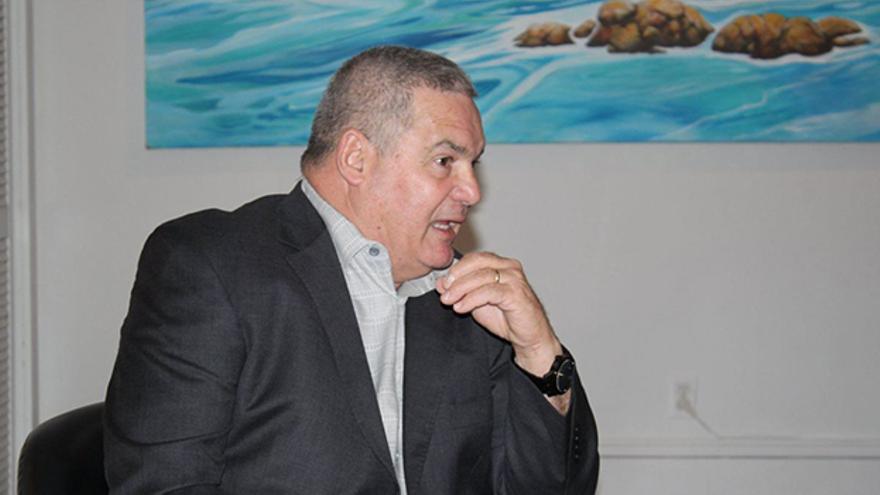
![]() EFE (via 14ymedio), Jorge I. Pérez, Miami, 25 August 2022 — The PEN Club of Cuban Writers in Exile, a subsidiary of PEN International, celebrates its 25th anniversary this Saturday with a new book about its history and the “stigma” of being a “political organization” financed by the United States, something that according to its president, the poet Luis de la Paz, “is a fallacy.”
EFE (via 14ymedio), Jorge I. Pérez, Miami, 25 August 2022 — The PEN Club of Cuban Writers in Exile, a subsidiary of PEN International, celebrates its 25th anniversary this Saturday with a new book about its history and the “stigma” of being a “political organization” financed by the United States, something that according to its president, the poet Luis de la Paz, “is a fallacy.”
“Our organization responds to the statutes of PEN International of writers, but these 25 years we have had to fight against an aggressive campaign by the Cuban Government that calls us ’second-rate’ writers, a political organization and one funded by the CIA and the American Government,” De la Paz tells EFE in an interview.
According to PEN International, one of the first NGOs in the world founded in 1921 by the British woman, Catherine Amy Dawson Scott, “PEN centers are the voices of literature and freedom of expression in their respective countries.”
The organization, based in London and currently chaired by Kurdish novelist, Burhan Sönmez, is present in more than 100 countries.
“We were the first world organization and group of writers to emphasize that freedom of expression and literature are inseparable,” declares the organization.
Its name was conceived as an acronym for Poets, Essayists, Novelists (PEN), which was later expanded to poets, playwrights, editors, essayists and novelists.
The history of the Cuban PEN writers dates back to 1945, when the journalist Jorge Mañach, author of one of the most controversial biographies about José Martí, “Martí the Apostle,” founded the subsidiary.
Then “long years” were interrupted, says De la Paz, when the Government of Fidel Castro arrived, and cultural institutions such as the state Casa de las Américas and the Union of Writers and Artists of Cuba were created, which “displaced” it.
The Cuban PEN, according to De la Paz, ceased to function after the Government took measures based on “Words to the Intellectuals,” in a speech given by Castro shortly after coming to power, at the National Library in 1961, in which he said: “Within the revolution everything, outside the revolution, nothing.”
“Censorship began, and many took the path of exile,” explains its president.
“It was at the 64th Congress of PEN International, held in 1997 in Edinburgh, Scotland, when, by unanimous vote, the creation of the PEN Club of Cuban Writers in Exile, based in Miami, the capital of Cuban exile, was approved,” recalls De la Paz, also a journalist based in Florida.
The poet and former political prisoner, Ángel Cuadra (1931-2021), along with other writers in exile, was the one who reactivated the Cuban PEN center, in 1997. During his captivity, Cuadra had been an Honorary Member of the Swedish PEN.
For the Cuban writer Rolando Morelli, “the Pen Club in exile must be considered, properly speaking, as a continuation of the one founded by Mañach.”
“We went into exile to preserve and conserve an ideal Cuba outside the island; that is, a symbol and embodiment of the best of our traditions,” Morelli adds from Philadelphia (Pennsylvania), where he directs the publishing house La gota de agua [The Drop of Water], which, he said, is preparing a report on the Cuban writer exiled in Spain, Gastón Baquero (1914-1997).
“Naturally, I’m honored and satisfied to be part of an institution that is a global and local reference for commitment to freedom and the defense of writers,” said Morelli, a member of the Cuban PEN in exile.
De la Paz, for his part, is proud to present this Saturday, in Miami, a book that collects all this history: “Homeland and Culture, 25 Years of PEN”, by the poet, Sara Martínez.
Next September, De la Paz and Morelli will travel to Uppsala, Sweden, to participate in the 88th PEN International Congress, which will take place from October 27 to October 1.
There they will present a resolution where “the arbitrary imprisonment of writers and plastic artists and the increasing persecution of intellectuals are denounced.”
“In exile we don’t have major problems with freedom of expression, but we do reject the lack of it on the island. Artists such as Tania Bruguera and Yunior García Aguilera are being forced into exile. The Cuban government used to try to prevent you from leaving; now it invites you to leave and doesn’t let you return. This is what is happening now,” said De la Paz.
Translated by Regina Anavy
____________
COLLABORATE WITH OUR WORK: The 14ymedio team is committed to practicing serious journalism that reflects Cuba’s reality in all its depth. Thank you for joining us on this long journey. We invite you to continue supporting us by becoming a member of 14ymedio now. Together we can continue transforming journalism in Cuba.
